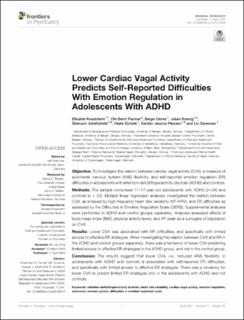| dc.description.abstract | Objective: To investigate the relation between cardiac vagal activity (CVA), a measure of autonomic nervous system (ANS) flexibility, and self-reported emotion regulation (ER) difficulties in adolescents with attention-deficit/hyperactivity disorder (ADHD) and controls.
Methods: The sample comprised 11–17-year-old adolescents with ADHD (n=34) and controls (n = 33). Multiple linear regression analyses investigated the relation between CVA, as indexed by high frequency heart rate variability (HF-HRV), and ER difficulties as assessed by the Difficulties in Emotion Regulation Scale (DERS). Supplemental analyses were performed in ADHD and control groups separately. Analyses assessed effects of body mass index (BMI), physical activity levels, and HF peak as a surrogate of respiration on CVA.
Results: Lower CVA was associated with ER difficulties, and specifically with limited access to effective ER strategies. When investigating the relation between CVA and ER in the ADHD and control groups separately, there was a tendency of lower CVA predicting limited access to effective ER strategies in the ADHD group, and not in the control group.
Conclusion: The results suggest that lower CVA, i.e., reduced ANS flexibility, in adolescents with ADHD and controls is associated with self-reported ER difficulties, and specifically with limited access to effective ER strategies. There was a tendency for lower CVA to predict limited ER strategies only in the adolescents with ADHD and not controls. | en_US |

